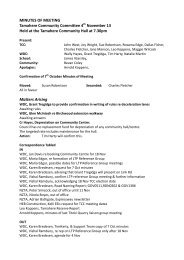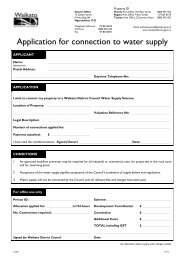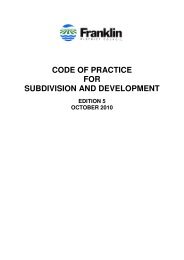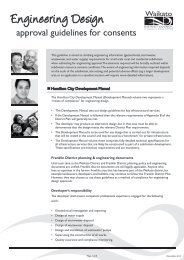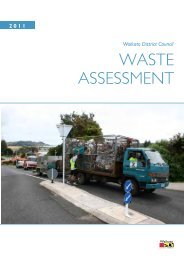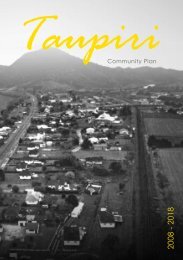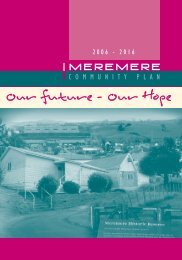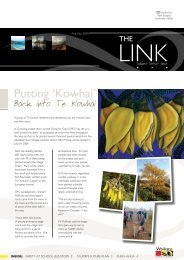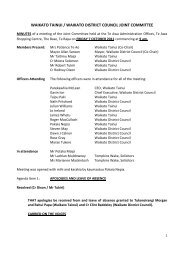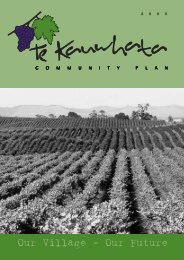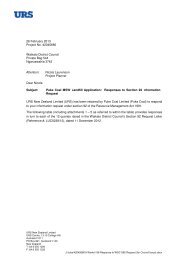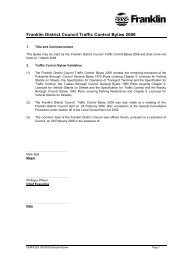1% - Waikato District Council
1% - Waikato District Council
1% - Waikato District Council
- No tags were found...
You also want an ePaper? Increase the reach of your titles
YUMPU automatically turns print PDFs into web optimized ePapers that Google loves.
72NAVIGATING THE FUTURE | WAIKATO DISTRICT COUNCILWhat’s plannedThe following are the major initiatives in the plan. The full workprogramme (capital and operational spending) is listed on pages53-54 in Volume Two.Waste Management & Minimisation PlanWe need to reduce the amount of waste going to our landfills.While we have a recycling service now, we also know morerecyclable waste can be taken out of what goes into the landfill.When we reduce our waste, we also reduce the amount ofmoney we have to pay for the government waste levy (whichis likely to go up in the near future). As well, there will be anEmissions Trading Scheme charge on the amount of methanethat is produced at landfills, which means we will have to buycarbon credits per tonne of rubbish dumped into the landfill.All of this puts a greater burden on our rates.We need to address this, but the question is how? We havereviewed our Waste Management Plan and as a result ofthat review, have developed a draft Waste Management andMinimisation Plan so that we can better manage our waste forthe long term.Our goals are to:• Manage waste locally wherever possible and to work withthe community.• Reduce the amount of waste sent to landfill or other disposal• Lower the total cost to the community of managing waste,while increasing the economic benefit through new initiativesand infrastructure• Reduce the risk of environmental damage• Protect public healthIt will take the community working together to achieve thisplan. One idea to do this is to establish a partnership based onXtreme Waste, which provides most of the waste managementservices for Raglan and the surrounding area. This is a way forthe community to have a direct and immediate influence overtheir waste services.We also want to improve the links between the council andthe waste management sector. We’re suggesting a wastemanagement sector working group. This could includerepresentatives from organisations already operating withinthe <strong>Waikato</strong> <strong>District</strong>; those thinking about expanding into thedistrict and other bodies with an interest in this sector or ineconomic development.What else can we do?Some of the initiatives we think would help us reduce ourwaste are:• Extend the range of what we collect for recycling, such asmore plastics being recycled. This would mean less goingto the landfill• Collect recycling from kindergartens and schools, especiallyin rural areas serviced by existing recycling contracts• Collect recycling from commercial operations, whichwould pay for the service through user charges• Collect food waste separately for composting• If we collect food waste, we could change the collectionof left-over rubbish from weekly to fortnightly, offsettingthe cost of the new food waste service.We’re also considering a bylaw which would requirecommercial waste collection companies to provide informationto the council about the types and amounts of waste collected.This would help us better understand what is happening to thewaste generated in our communities. It would complement thework done by the waste management sector working group.In this plan, we will upgrade our Huntly, Raglan and Te Kauwhatatransfer stations to encourage better recycling. This is budgetedto be $807,000 (inflation-adjusted) from 2012 to 2019.In 2013/14 we will be consulting you about what you’d like tosee for collection services. Our aim is for whatever we do, tobe cost neutral. For instance, if we collect food waste separatelyon a weekly basis, we would then have to balance this with theregular rubbish collection being a fortnightly service.The draft Waste Management & Minimisation Plan documentis available at our service centres and the council’s officeon Galileo Street, Ngaruawahia. It is also available on lineat www.waikatodistrict.govt.nz.• Parliament is considering the Alcohol Reform Bill, which isscheduled to come back before the House in June. This willresult in a new Sale and Supply of Alcohol Act, expectedto come into force in 2013. It’s likely to have significantimplications for how we administer liquor licensing. The billas it stands requires all applications to be determined by acommittee with no power of delegation to staff. This couldresult in higher costs and increased time for approvingapplications.Local alcohol plans will also be provided for under the newlaw, which would mean significant consultation with thecommunity. These plans would be voluntary. However, thereis significant community interest in liquor licensing issuesin our district and this would be taken into account whenmaking any decisions. We could include local alcohol plansin our <strong>District</strong> Plan considerations, which would help reducethe cost while still keeping the community involved.• Parliament is also amending the Building Act 2004. In thebill now before Parliament, there are four new categoriesof building consents – Low Risk, Simple Residential, Standardand Commercial. The bill also redefines building consentauthorities’ responsibilities and reduces the timeframe (tofive days) to process Simple Residential consents. Whilethe Department of Building and Housing suggests buildingconsent authorities’ workload could drop about 25 percent, the shorter timeframe for processing simple residentialconsents might also increase the workload. When the billis enacted, we will have a better view of what effect thechanges will have for us.• Another law now before Parliament is the Food Bill, whichwhen enacted will replace the Food Act 1981. Yes. It isthe Food Act 1981, which is now 30 years old and needs



